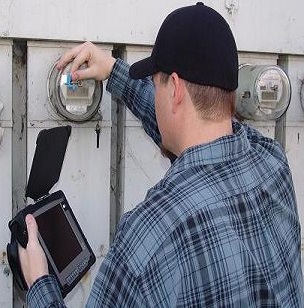Surprise
When AMREL did its annual review, we were surprised by one finding: there was a marked uptick in the number of people buying rugged computers for personal use. While there has always a few folks who bought rugged platforms for themselves, our traditional customer base has been overwhelmingly enterprise oriented.
Why this sudden interest in rugged computers by consumers? Should you be considering a rugged computer for yourself or your organization?

What is rugged?
Before we discuss the reasons why a consumer or an institution would buy a rugged computer, we should define what that is.
“A rugged (or ruggedized, but also ruggedised) computer is a computer specifically designed to operate reliably in harsh usage environments and conditions, such as strong vibrations, extreme temperatures and wet or dusty conditions.” Wikipedia
In general, a rugged computer meets the military standards of MIL-STD 810 (harsh environmental conditions) and sometimes MIL-STD 461 (electromagnetic interference). They also have a high Ingress Protection (IP) Rating, which indicates safeguards against solid particulates and liquids.
Some computing platforms are designated “business rugged,” “semi-rugged,” or “having been built to MIL-STD.” These platforms may or may not have rugged features; “semi-rugged” is a marketing, not an engineering term. The only reliable indication of true ruggedness is independent certification of meeting the relevant standards.
Truly rugged computers are built from the ground up with a durable fame, shielded connectors, reinforced corners, and other strengthening features. Some try to ruggedize their computers by buying protective casings or sleeves. The effectiveness of these casings can be charitably described as “variable.” They may offer some protection, but they do not make your non-rugged computer as reliable as one that has been independently certified to military standards.
For more details on military standards and what makes a computer rugged, see Rugged inside and out as well as MIL-STD & IP explained.
Traditional rugged consumers
As one would expect, the military is a prominent customer of rugged computers. Soldiers’ lives depend on their laptops, tablets, and handhelds operating even in difficult and challenging conditions. Police and fireman also want computers that can take a pounding.
Other customers include:
- Warehouse and logistic workers who do not want to stop conducting inventory when their handheld falls three feet on a concrete floor.
- Surveyors who work outdoors in all sorts of weather.
- Scientists want a reliable platform to store and mange difficult-to-obtain data collected in rough remote areas.
- Food processors whose devices need to survive being hosed down with high pressure water.
Rugged computers cost more and are more economical
Increasingly, enterprise users who do not work in rough environments are buying rugged computers. They are motivated by the most basic of business reasons, the bottom line.
While the initial price of a rugged computer may be more than a non-rugged one, the long term cost (Total Cost of Ownership, i.e. TCO) is much less. A highly publicized study by VDC Research identified specific areas in which rugged computers save money:
- Rugged computers break down less often, so the cost of managing and supporting them is less.
- Less downtime means lower lost productivity costs, fewer lost data hours, and fewer repairs.
- Rugged computers have much better support for parts than their consumer counterparts and therefore have longer life cycles.
- Longer life cycles mean less need for training, reconfiguring, and integrating new devices.
- Frequent downtimes can alienate and loose customers.
Why doesn’t everybody buy a rugged computer?
Smartphones are by far the most common mobile computers used by individuals. Unlike most rugged computers, you can put a smartphone in your pocket. Their low processing power is irrelevant, because intensive computing resources are not needed for most common tasks, i.e. checking emails, texting messages, and occasionally surfing the net.
Smartphones are relatively cheap and easily replaced. If someone breaks their smartphone, their most important personal data (usually emails and contacts) is not lost, because it is stored or automatically backed up on the cloud.
The “fat server/thin client” model employed by smartphone users deemphasizes the value of hardware durability. As software, applications, and the cloud, becomes more important, hardware becomes less so. Not convinced? Just ask yourself, which would be more disastrous, losing the data on your mobile computer, or losing the data on your online email provider (i.e. gmail)?
Smartphone model breaks down
Recently, the battery on my phone started dying on me unpredictably. I went to the local phone store to have the battery checked or replaced.
Since I have had the phone for a period of time longer than the life span of a fruit fly, I was informed that the battery was no longer available. When I asked if my current battery could be checked, the clerk said that the store no longer did things like that. The phone would have to be sent to someplace in Texas for several weeks. When I complained about the lost time, the clerk helpfully suggested expensive upgrades for my phone.
I actually considered sending my phone to Texas. It’s a phone primarily for personal use. I can live for a few days without receiving emergency phone calls from my wife requesting that I pick up a can of peas on my way home from work.
However, I do use the phone occasionally for business. If I go without my phone for a while, wouldn’t Murphy’s Law dictate that would be the exact time that a hard-to-reach, very important client tried to call me?
This incident illustrates problems with the smartphone model. I experience lack of support for parts, virtually nonexistent repair services, and the need to replace the phone more frequently than I desired. None of these problems are new, and, as mentioned above, are tradeoffs that consumers have traditionally made in exchange for the convenience and relatively low cost of smartphones.
Blurred lines
What is new is the blurring of the distinction between business and non-business mobile devices. Check out any IT news source, and you will find multitudes of stories about workers demanding to use their own devices for business purposes. IT workers have had to scramble to integrate a hodge-podge of heterogeneous mobile devices into their company’s communication system. According to VDC Research, 35% of organizations in 2012 currently have a Bring Your Own Device (BYOD) policy with another 33% planning to adopt one.
The BYOD movement is even affecting the military. One of the big surprises in recent wars was that consumer mobile devices used by soldiers were often better than the ones supplied by the military. The Department of Defense is aggressively trying to tap the leading edge of consumer products, while maintaining tight security. To a certain extent, this is one reason why the program to develop a new communication device (Project Manager Warfighter Information Network-Tactical [PM WIN-T]), isn’t actually involved in procuring new hardware; it is creating applications that can be run on multiple platforms.
Consumers may be willing to forgo inconvenience of poor support and frequent replacements for a personal phone, but definitely not for a business machine. For business, they need something more reliable, like a rugged computer.
The anti-cloud
Storing critical data on the cloud can be problematic. Surveys by Kroll Ontrack, Carbonite, and Symantec found that 40% to 65% of businesses have experienced data loss in the cloud. Often, these data losses are minor, but sometimes they can be catastrophic. A 2011 crash by Amazon Web services seriously impacted numerous businesses.
In addition, the cloud presents uncomfortable legal and security issues. In the legal wrangling that followed the exposure of NSA spying, many cloud users had a disquieting revelation: they do not necessarily own the data they store on the cloud. If online mailbox hosting service permanently deleted your business emails for the last 3 years, or even sold them to your competitor, would you have legal recourses? Businesses are discovering that the answer is not as clear as they would like it to be.
The massive data theft by Edward Snowden demonstrates another weakness of the cloud. While most businesses correctly assume that their proprietary information is of little interest to security agencies, they cannot be sure that will be true for all of their employees.
The NSA desperately needs analysts like Snowden to process the massive amount of information that flows through their super-computers. As a result, they have relaxed some of their usual screening measures for personnel. While the NSA could care less about your rent-a-cat start-up, it is possible that a contract employee may be fanatical animal rights activist who decides to destroy your evil enterprise. Although there has been no evidence of NSA employees selling proprietary information to competitors, the possibility cannot be discarded lightly.
If the cloud is too insecure to store important data, then the “fat server/thin client” model breaks down. Hardware and its durability become more important.
Cloud-independent mobile solutions
Biometric enrollment in a combat zone presents a good example for the need of a cloud-independent solution. During patrols in Iraq and Afghanistan, soldiers would capture iris images and fingerprints of locals, and then compare then to databases located in the cloud.
Bouncing off satellites to networks in West Virginia, a single set of fingerprints could take 45 minutes to process. Sweeping a village could take all day. This not only annoyed the villagers, but also it deprived soldiers of a critical asset, their mobility.
The ROCKY DB6-B, a mobile biometric solution, has the connectivity to access the databases in the cloud, but it also has a powerful ATOM processor, as well as a large memory. This enables soldiers to store information locally, so they can dispense with the time-consuming process of accessing overseas databases. With the DB6-B, biometric enrollment and verification of identities is now near instantaneous.
Rugged computers in your pocket
One reason consumers have avoided old-fashion rugged devices has been their size. Rugged computers have been traditionally larger and heavier than their consumer counterparts. However, a new generation of computers is overturning the notion of what it means to be rugged.
The ROCKY DB6 demonstrates that consumers can now have convenience of a handheld and the reliability of true ruggedness. Weighing only 1.5 pounds, it fits easily into a cargo pocket, and it has been independently certified for MIL-STD 810 as well as IP 65.
Similarly, the ROCKY RS11 has pushed the boundaries of the laptop form factor. Only 1 inch thick, It is the thinnest fully rugged laptop in the world. You may get big muscles from going to the gym, but you won’t get them from hauling around this laptop.
Do you need a rugged computer?
In summary, reasons for consumers buying rugged computers include: the breakdown of the “fat server/thin client” model, growing utilization of personal computers for business purposes, distrust of the cloud, need for support/repair services, working in hazardous environments, and more convenient, ever-smaller rugged form factors.
Is a rugged computer right for you? Before you decide, consider the factors described above:
- Do you work or live in an environment that is likely to subject your mobile device to damaging trauma?
- Do you ever use your personal mobile device for business purposes?
- How important is your data? How much do you trust the cloud?
- How valuable is your time? For most businesses, lost productivity, lost data, lack of repair/support, and the need for frequent purchases are more expensive than the initial higher cost of a rugged computer. Is this true for you?
- The DB6 can run full Windows; smartphones usually have limited OS like Windows CE. Do you use business applications that require full Windows environments?
While the above checklist may be helpful, only you can decide if you need a rugged computer. If you do buy a rugged computer, you will discover that you need not compromise on ease-of-use, mobility, or economy. Whether you’re a soldier in theater, an engineer in the field, or a top executive making billion dollar deals, a fully rugged computer provides you the power, convenience, and peace of mind that you require.










